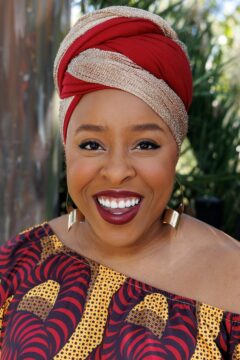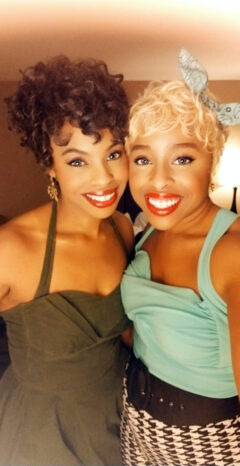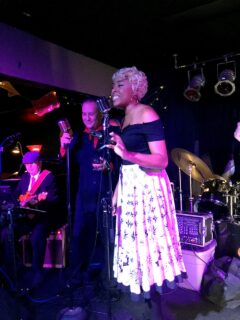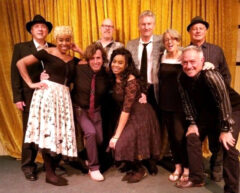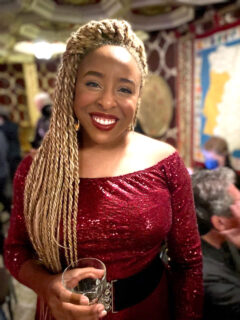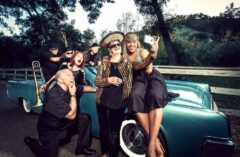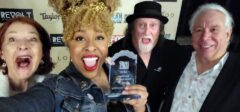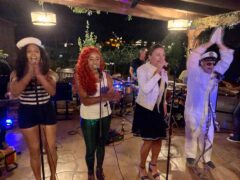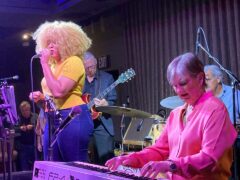Cover Story
Liz Ajuzie: Coming Out Swingin’
When you sit down with Liz Ajuzie it becomes very apparent, very quickly, that she has a clear understanding of what matters most. Family is first; music, a close second. But Liz’s love and respect for both seem so intertwined it could very well be the other way around. When pressed, she just smiles, “My family was musical.” Growing up, Ajuzie lived all over North America; she was born on the East Coast and spent most of her formative years in the South and Midwest. Today, you’ll find her extending family ties by planting a few, new soulful roots right here in Southern California.
With exposure to so much culturally and geographically, Liz equates the diversity to that of her own musical direction. “I like to do a bit of everything.” she says. “It gives you a breadth of knowledge…that if you just stay stationary, you won’t get.” Ajuzie lives and breathes that philosophy.
On any given night you may see her performing with the big band of Sue Palmer and her Motel Swing Orchestra. You may have also witnessed her sitting in with friends Big Time Operator. Along with her sister, Ruth Ajuzie, it’s possible you’ve seen Liz playing in a more intimate setting with the Jazz Pocket Swing band. Then there’s also a funk band called Sofa King Bueno. “We do Aretha!” she grins. “Dusty Springfield’s ‘Son of a Preacher Man…’ it’s exciting to delve into different styles of music and to just explore.” Exploring is an understatement; Liz Ajuzie digs deep into her creative and artistic pursuits and from what I can tell, it’s a labor of love.
San Diego Troubadour: Let’s start at the beginning and talk a little about family.
Liz Ajuzie: I’m Nigerian, well first generation American, so both of my parents are Nigerian. My dad went to school at Clemson University and after he graduated, he went back to Nigeria, met my mom and they got married. They came back here and started out in South Carolina and I was born in Connecticut. Dad worked at UConn in the heyday of women’s basketball.
***********************
…we loved to listen to vinyl records simply because I think
it was so tactile. You could touch the music.
—Liz Ajuzie
***********************
SDT: Travel seems to have been a constant in your life.
LA: Well, you’ve heard of Army brats, but there are other little-known Professor brats. [laughing] When your dad is a professor, he gets headhunted by different universities. He taught agricultural economics; he’s retired now but that was his field. After UConn he got a job in Louisiana at Southern University, and we lived in Baton Rouge for a couple of years. Then he ended up at Lincoln University in Jefferson City, Missouri. And that was where I spent most of my childhood. You know, a quick zig-zag across the East Coast, the South, and the Midwest. I think it was nice because, as a family, we got to see and experience a variety of American cultures.
SDT: And there was always music?
LA: It’s actually kind of funny in our family, our parents both being Nigerian and growing up when and how they did. My parents both lived through a war, which ended about 10 years before they came here. In our house we had a record player and my parents had vinyl. We had a radio, but we loved to listen to vinyl records simply because I think it was so tactile. You could touch the music and my parents loved old music. My parents didn’t necessarily listen to the music of their generation; they listened to music of their parent’s generation. Our vinyls were Nat King Cole and Perry Como, the old-school vinyl that we loved to listen to. We also had traditional African Nigerian music in our household. We didn’t listen to the radio a whole lot, so there’s kind of a swath of decades in music that I wasn’t familiar with. So as an adult I’ve had to learn that there are classic songs I had no idea existed because we just didn’t have it in our house. There was a whole lot of stuff we didn’t know, like disco or classic, early rock. It’s really been an experience getting to know, as a grown-up…like oh, yeah I see what people were having a moment about! It’s exciting.
SDT: Your limited exposure to other music didn’t seem to hamper you. You play piano, accordion, ukulele, and you sing, not only in English but in other languages…
LA: We were very musical. I think, traditionally, my Nigerian culture is very musical. There’s a lot of singing—my dad and my mom both sing; they don’t play instruments but sing, you know, hymns and things like that. Growing up singing, it’s been a very musical culture. And that translated to singing around the house to all the cassette tapes; God bless them that we would listen and sing along to. We have a real good ear for music, but we didn’t have any instruments around the house, really, growing up. When we moved to Missouri, one of our next door neighbors had an upright piano in their garage. It was an old clunker, slightly out of tune and the keys would stick a little bit. [laughing] But I’d get a song stuck in my head and if I was in the garage, I’d be picking out the notes to this song that I had in my head. I guess my mom was outside our house and could see me plunking away at the piano and she was like, “Gotta put the girls into piano lessons.” [laughing] And that was the start of that. I think I was in fourth grade.
My sister and I took piano lessons for about a year and one of the ladies in our church taught us how to read music. She had her classical books from when she was learning and she lent them to us and taught us what she knew. And then…fly bird! [laughing] She pushed us out of the nest. It was never really formal piano training, so it wasn’t so much recitals and things like that. If we mastered a song, she would have us play during the offertory in church, and that was kind of our recital. But just getting to know how to read music, I think that was the most important part. Once we weren’t in piano lessons any longer, we were able to still go to the music store and buy a sheet of music and learn how to play songs. I do say that I had classical training growing up. [laughing] To me…that’s what it was; we played classical music a lot. Our family is pretty musical; my older sister plays piano and she also plays the violin, she played in orchestra but didn’t play for a long time after getting out of school…but she’s been getting back into it. I have two younger brothers, one sings and the other one plays the cello and my littlest sister plays the viola and sings.
SDT: Five musical siblings! That’s your own big band! Do you get back to Missouri often?
LA: Unfortunately no, we used to try and go once a year or every two years. It’s kind of funny. I like to go home and visit around Christmas time or the holidays because you want to go home to family. But my mom always says, “No, I’ll come to you!” [laughing] Because she wants to get out of the snow! [laughing] So, I get it!
SDT: Most of your California fans probably know you best for your singing voice. Did that come along with your interest in piano?
LA: I’d say it was separate, because the piano came later. We always sang in our family, and I always sang, so voice was first. I’d always had an interest in instruments, but it just didn’t happen when we were younger. When you have five kids, you can’t always afford to put them all in lessons. But singing is free. So, I started out singing but didn’t do a whole lot with it. I joined the choir when I was in middle school and throughout high school, but I think the turning point for me was in college when I started doing theater. That’s where I think I discovered showmanship and I found my voice. I was able to express and understand the depth of my own voice and what I could do with it. Because up until then I had just sung chorally; it’s just blending and it’s a smaller space I was putting my voice into. And until then I didn’t realize what I could do. When I joined the theater, I learned how to manipulate my voice and I can belt now. It helped me understand there was more I could do. So, theater opened a lot for me. It also helped me because I have terrible stage fright. [laughing] It’s a strange thing. I love to sing and perform and it used to be bad when I was younger, but theater really helped with that—just getting used to being in front of people.
SDT: Your theater experience—were they musicals, dramas, or comedies?
LA: I never did straight plays in theater; it was all musicals. From childhood my mom always picked out videos out for us…we had three movie options: The Sound of Music, The Wizard of Oz, and Mary Poppins, which are musicals, so I got Judy Garland and Julie Andrews in my head, and, combined with the music we listened to on vinyl, it put me in that era. It’s very nostalgic for me even though I didn’t live through it. I feel nostalgic about that time and the music of that time. And the way people sang at that time, it brings out emotion.
SDT: That answers a lot of questions about how a young person can be so enamored with a musical style and time period, like the Big Bands of the ’40s.
LA: Yeah, I love the fullness of the sound. There’s still the blending of voice and instrumentation, and I think that’s where the beauty of that lies, for me. There’s so much you can do. You can sing a song with a two-piece; you can sing it with a keyboard and a drum set, or you can have a 10-piece brass band behind you and it’s a different level of excitement. You can interpret the same song many different ways.
***********************
Liz has a great voice, plays all kinds of instruments, and sings in several languages.
The band is completely inspired and we are just touching the surface of
what we can do in collaboration. She is a great and refreshing talent!!!
—Sue Palmer
***********************
SDT: And you do that with Sue Palmer and her Motel Swing Orchestra. But how did the accordion come into play?
LA: I blame Sue for that [laughing] I don’t consider myself a great piano player, but I know how to read music and she found out I know how to play the piano and she’s like, “Well, this is a piano; it’s just smaller…and sideways! [laughing] So, here are some chords and let’s do the song.” It’s fun though.
SDT: What about blues influences—I’ve heard your cover of Nina Simone’s “Do I Move You” and it’s tremendous.
LA: I have my short list, I guess. There are the classics like Billie Holiday, Ella Fitzgerald, and Judy Garland. I loved Judy’s way of performing and her voice. Sarah Vaughn had depth and such a rich sound. And Etta James. I had a lot of jazz influences thanks to our vinyl collection. Choir was an education and interesting and that’s where I got my propensity for singing in different languages. That’s where we were introduced to singing songs in French and singing songs in Italian and German. It made it a little easier to learn songs in different languages.
SDT: When you played at the Troubadour Christmas gathering last year, you performed in French.
LA: I was a little bit nervous singing for the Troubadour because there’s this community of musicians I never get to see. It’s a funny thing about being a musician is that you never get to go to your friends’ gigs because you’re playing at the same time. It was so amazing to see everyone in the same place and I love the Troubadour for being able to do that. It was a little intimidating but also super cool.
SDT: How did you make your way from Missouri to Southern California?
LA: My sister and I moved out here in 2016. She’s a year and a half older than me and it’s been great. You don’t feel so alone due to the shock of a new place and leaving your family and your friends. When we landed in Southern California it was hard at the beginning because we were in a void of creativity. We lost our theater community and our music and jazz communities and we suddenly had nothing. For just under a year it was pretty hard, creatively anyway. I came home from work one day and was just sitting in my living room and I told myself I needed to hear live music; I just had to get out of the house. I went on Facebook and searched events and live music and saw a group that was playing at Tio Leo’s called the Jazz Pocket Swing band. So, I dressed up and I took myself out to go see live music…and it was wonderful! [laughing] When you’re a creative person and there’s nothing, you don’t realize it until there’s a void.
After they played, I stuck around and the bass player, Steve [Hoshko], came up to the bar and I asked, “Hey, how often do you guys play here? I want to come back to see you.” He told me they were playing weekly at the Blarney Stone in Clairmont, and I started going there every week. I eventually dragged my sister along and one day they said, “Do you sing? Do you know any jazz songs?” Yeah, I know some. And they said, “Well come up and sing!” And I came up and sang “My Funny Valentine” one day and then every week they had me come up and sing a song. Then it was, “What else can you sing? …and let’s add to it.” I slowly added more music; then my sister Ruth started playing violin with the band and we got to know them really well and we’re still playing with them today. We used to play weekly but Covid tripped everything up, but now it’s a monthly gig at Tio Leo’s. The Jazz Pocket Swing band was the first.
***********************
One of the most amazing things about Liz is how quickly and willingly she learns everything.
I know she might not have been as familiar with some of the genres that Sue does with
the Motel Swing Orchestra, but she immediately absorbed it all and hasn’t stopped. It has also
been great to see how she and the band have developed this past year since she joined.
I think her effect has been great on Sue and the band in both sound and spirit
and I know they would all agree.
—Laura Chavez
***********************
SDT: So how many projects are you involved with now?
LA: Jazz Pocket Swing, of course. Through Laura Chavez, I had the pleasure of being introduced to Sue Palmer. I met Laura Chavez at Tio Leo’s at one of our jazz nights and she just happened to be in town at the time. We were all introduced and all became friends and started to hang out. Laura said, “You’ve got to meet Sue Palmer.” I had heard the name but had never seen her. “You have to meet her; she’s looking for a new vocalist.” she said. “I think you guys would get along great together.” And we met and that’s the beginning of the story.
SDT: It wasn’t long afterward that you went into the studio to record Movin’ Along (reviewed in this issue).
LA: We met in March 2021 and since Gator by the Bay was canceled that year, they had a Gator showcase with a couple of bands playing at Tio Leo’s. Sue said to come up and sing a couple of songs. So, I sang a couple of songs with them that we had rehearsed, and it went over really well, so Sue said, “Let’s keep doing this.” I said of course…a resounding Yes! [laughing] I really feel that I’ve lucked out and have met so many amazing people. Movin’ Along was my first studio record, which was a completely new experience for me. I had never been in a studio before that. It was different being in a little space with a microphone in your face. It was nice because I loved the setup. We recorded at Thunderbird Analog Studio in Oceanside. And it was the first album I’ve officially recorded; my sister and I used to make home recordings.”
Author’s Note: Movin’ Along won Best Local Recording at this year’s San Diego Music Awards. Here’s little taste!
SDT: Do you write music?
LA: I have written music. I wrote a song called “Locked Up in Georgia.” I heard a story from Jonny Viau during rehearsal one day, and everybody contributed to the story and the background to what happened. It probably wasn’t hilarious at the time but it was during the retelling. [laughing] But the next day I was at home on break from work and I was sitting outside. That’s when I feel my most creative, when I’m outside. So, I’m taking a break with my little book and the lyrics just popped into my mind and I just started writing. This could be a traditional blues, so the next day I told Sue I had written a song and it’s about you! [laughing] I don’t know if she was worried or what. [laughing] That’s the first song I’ve written that has panned out from start to finish. I’m usually bad at connecting the two, I can write melodies and I wrote a lot of poetry when I was younger, so I can write words and I can write music, but I haven’t been able to blend them together very well. I’ve been finding a lot of inspiration lately. In different types of music and being around more musicians than I’ve never been; it’s been inspiring and it gets my juices flowing.”
SDT: Let’s talk about the other bands. You occasionally play with Big Time Operator.
LA: I do. I’d seen them before and I love Big Band music. My elementary school teacher introduced me to Big Band music. Her name was Mrs. Wolf and she was amazing. That was her style and she didn’t hold back when it came to introducing kids to a wealth of music, not just the new stuff. And that stuck with me; I loved the sound of it. The swinging…it gets you. It was through one of the Jazz Pockets—Warren [Lovell], who is the male lead in Big Time Operator—who invited us all out to have dinner with him and his family. It was Karaoke night and it was a giant group of us just hanging out and having fun. He invited us up to sing, saying, “What do you know? Sing something!” So, I sang, “Dream a Little Dream of Me.” Then the next time Big Time Operator played, Warren invited me up to sing a song with their band. I think I sang some Etta James…and that’s how that came about. I’m not their constant, but if the main person isn’t able to play…I really enjoy it.
SDT: You also play in a funk band?
LA: I do! [laughing] It’s has been a really steep learning curve for me. It’s called Sofa King Bueno [laughing] We haven’t done a lot because of Covid, but we’re trying to get back on it again. It’s about eight or nine people and it’s a big funk band. We have brass and keyboards, drums, bass, and percussion. We have a number of singers—a male singer as well as my sister and I. We do Aretha, Dusty Springfield’s “Son of a Preacher Man,” and we’re trying to incorporate new music into it now. It’s exciting; I love to delve into different styles of music and to just explore.
SDT: Are there comparisons you can make in these different styles and genres or is it more of a departure from your comfort zone?
LA: For me, it’s a departure, butI will say being involved with Sue’s band and the blues aspect has helped with the funk music as crazy as that is. For me the vocal stylings can sometimes be similar in the way I sing it. There’s a bit more of a bottom end…yes! [laughing] But with funk, there’s that groove, a different feel. Sofa King Bueno is a fun group of guys that love to party!
SDT: You don’t seem to have limitations either in style or genre.
LA: Yeah, I like to do everything. I grew up singing hymns in church. I’ve done classical music in school and jazz music and blues music and now, funk music. I love to do a little bit of everything. I think it’s important because it gives you a breadth of knowledge that if you just stay stationary, you won’t get. Like I said with the blues and the funk, sometimes they help each other out. Learning classical helped my breathing techniques when I sing jazz. I’ve been able to link my different genres and that’s been helpful for me.
SDT: Your name is as fascinating as your music…
LA: I guess I can explain that. So, my name is Elizabeth Chinyere Ajuzie; it’s Nigerian and it means “the Giver.” Basically, breaking the names apart translates to “God Gives.” All the kids in my family have Nigerian names, it’s traditional. We have an English name and a Nigerian name.”
SDT: Looking ahead, any projects, more studio time?
LA: I’m hoping to have a showcase around my birthday in September, but we’ll see how that goes. I want to do a combination of all the different types of music I’m interested in and enjoy singing, get a couple of musicians on stage, and do some switcheroos…I’m still working on the logistics of it. Before the end of the year, there will be a showcase!
SDT: Out of all the styles and genres, can you pick a favorite?
LA: Well, it’s hard to pick a favorite. I love to listen to Big Band music because it makes you want to move. I like Harry James; I love listening to that sound…it’s so beautiful. I also love, you know, the movie Corrina, Corrina with Whoppi Goldberg. That scene where she goes to a lounge and there’s a singer, I believe it was Jevetta Steele and she’s singing “Somewhere Over the Rainbow,” which I know because of Judy Garland and the Wizard of Oz! See, it all ties together! She was singing in this smoky lounge, kind of a jazz club, and that scene always stuck with me. In school, when my teachers would ask “What do you want to do when you grow up?” that is what I pictured in my head. I want to sing in that lounge, on the stage, in the darkness and the booths, and the smoke. I had the idea I wanted to be that type of singer. I have this love in my heart for small groups of instrumentalists. Ella Fitzgerald had that a lot, Billie Holiday with Lester [Young]…four people or five people that make this beautiful music, music that makes you feel…you breathe it in and out.
SDT: So, 20 years from now, I’m going to find you in a smoky lounge?
LA: Here’s hoping! [laughing]










